Unit 2 I think that mooncakes are deliciou.九年级英语全一册同步必备知识清单(人教版)
文档属性
| 名称 | Unit 2 I think that mooncakes are deliciou.九年级英语全一册同步必备知识清单(人教版) | 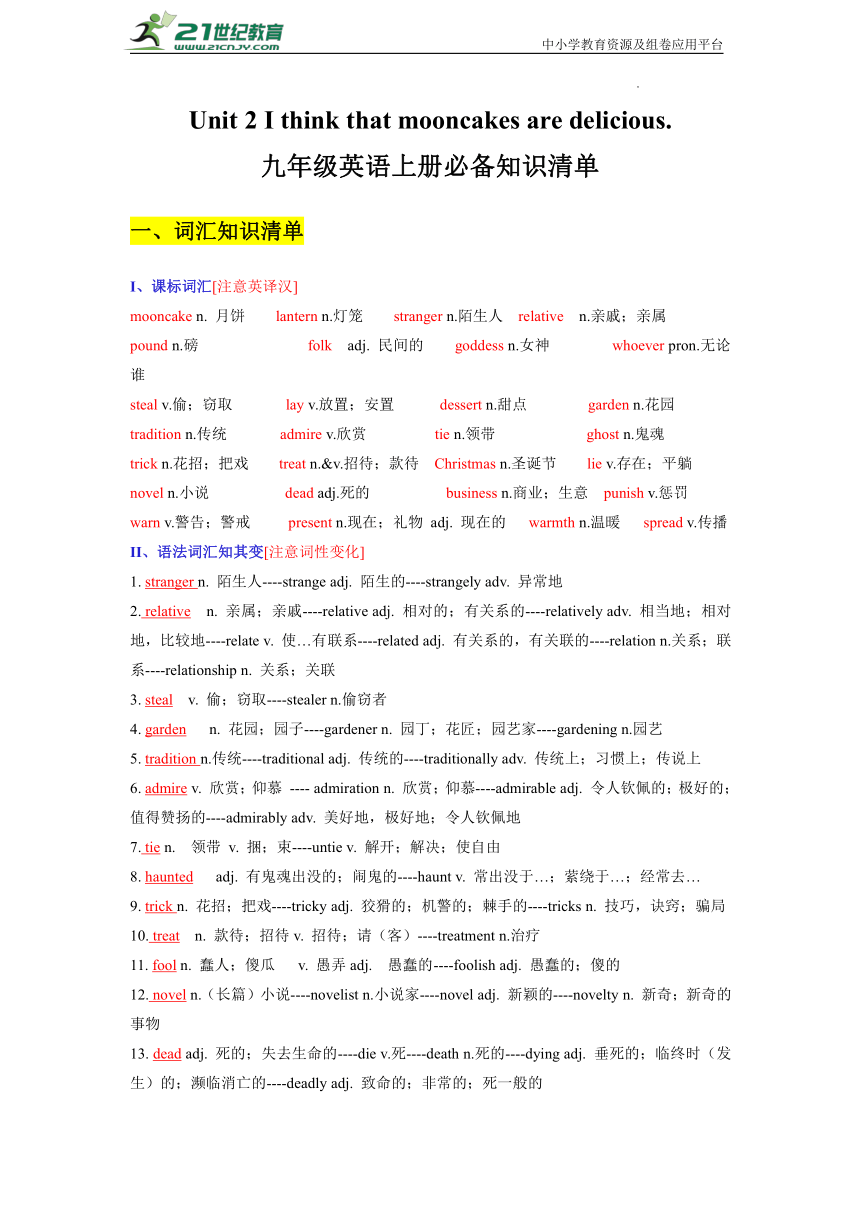 | |
| 格式 | docx | ||
| 文件大小 | 446.4KB | ||
| 资源类型 | 试卷 | ||
| 版本资源 | 人教新目标(Go for it)版 | ||
| 科目 | 英语 | ||
| 更新时间 | 2024-10-17 20:01:28 | ||
图片预览

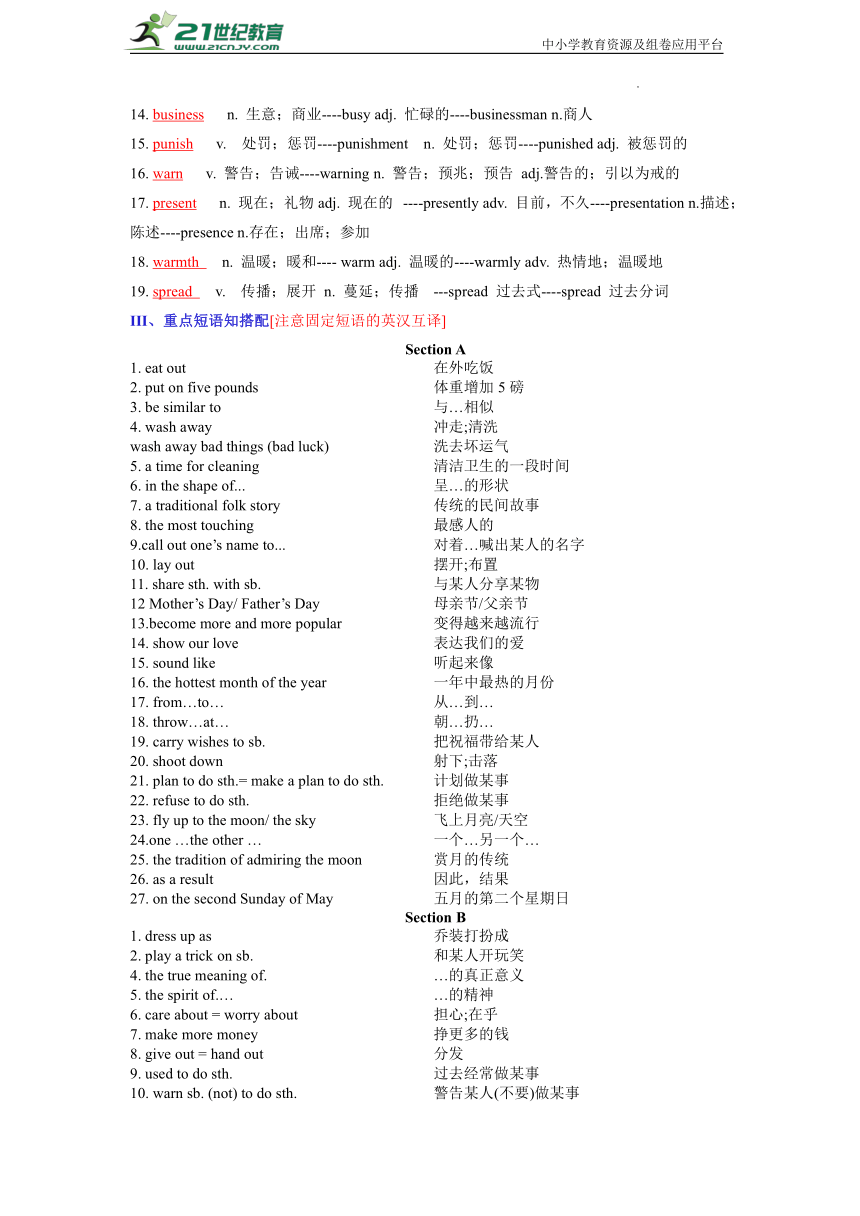
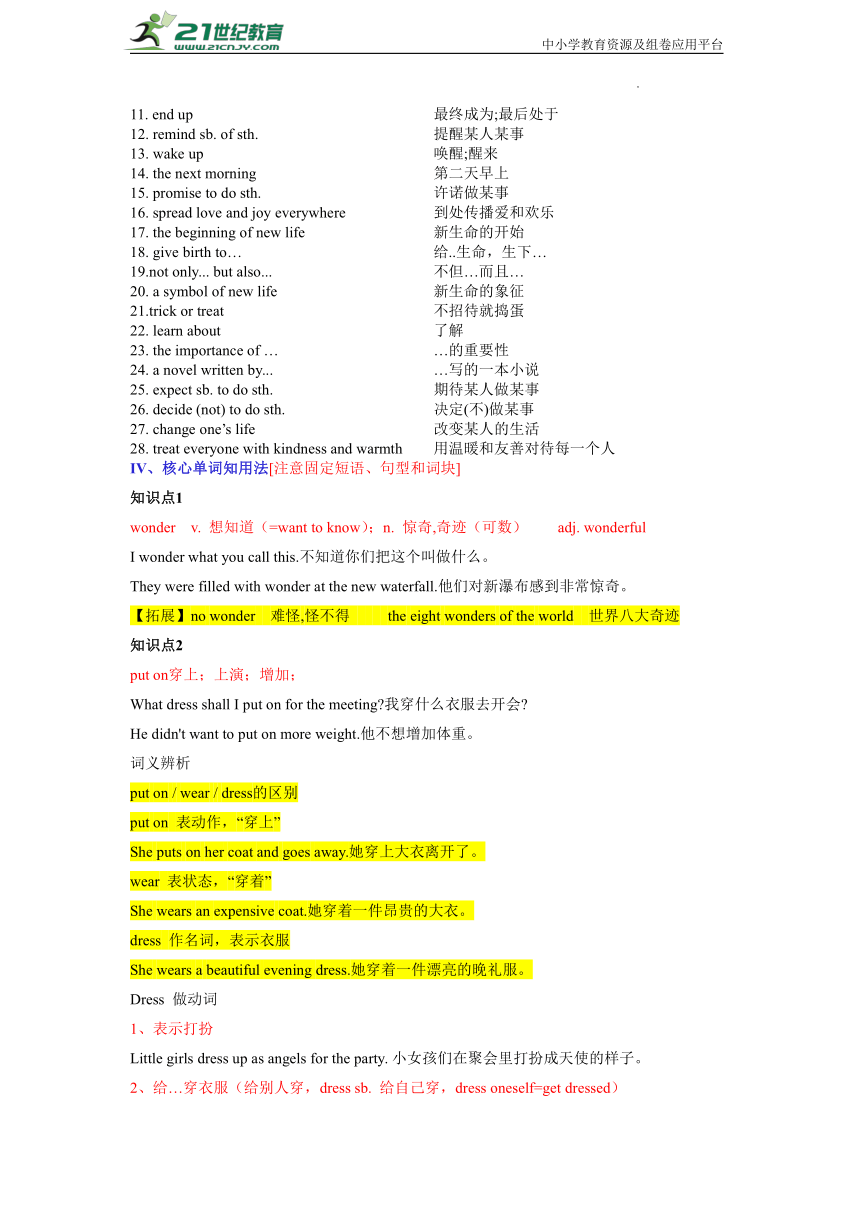
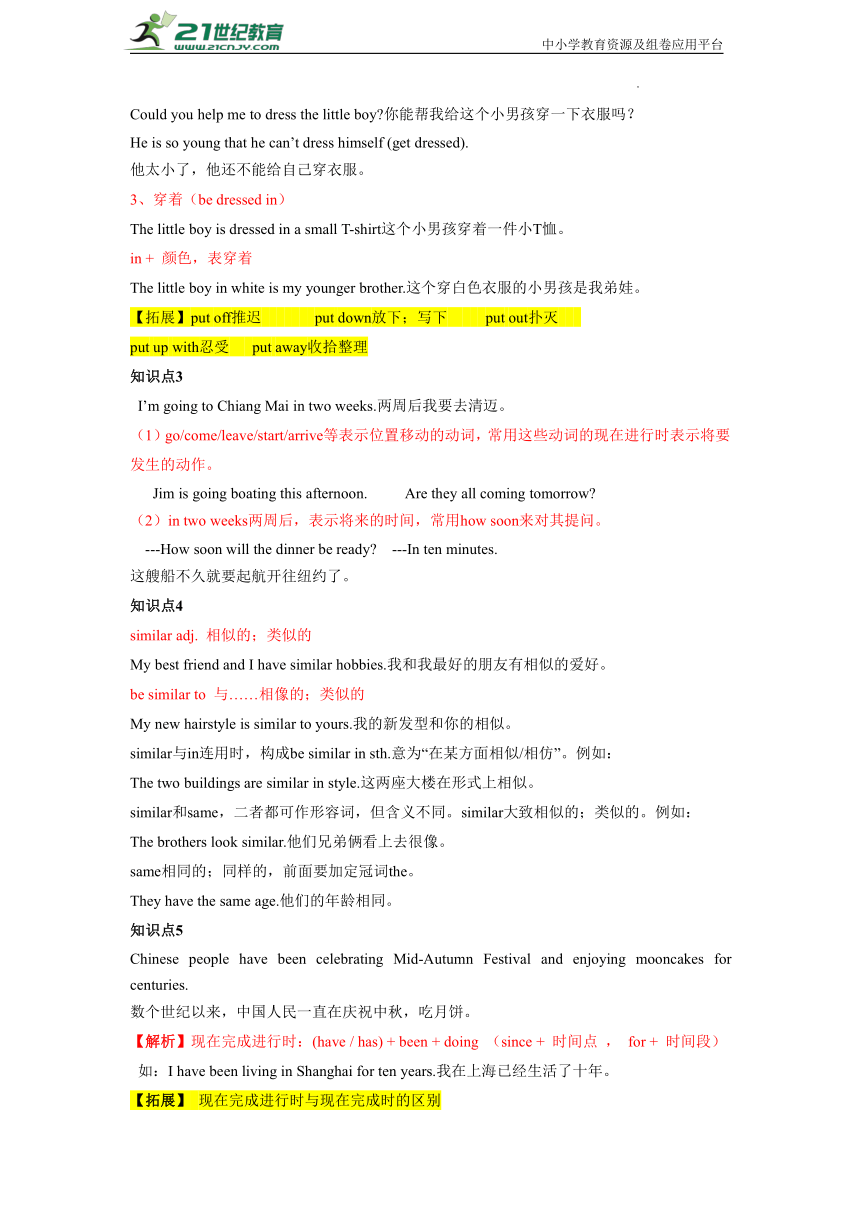
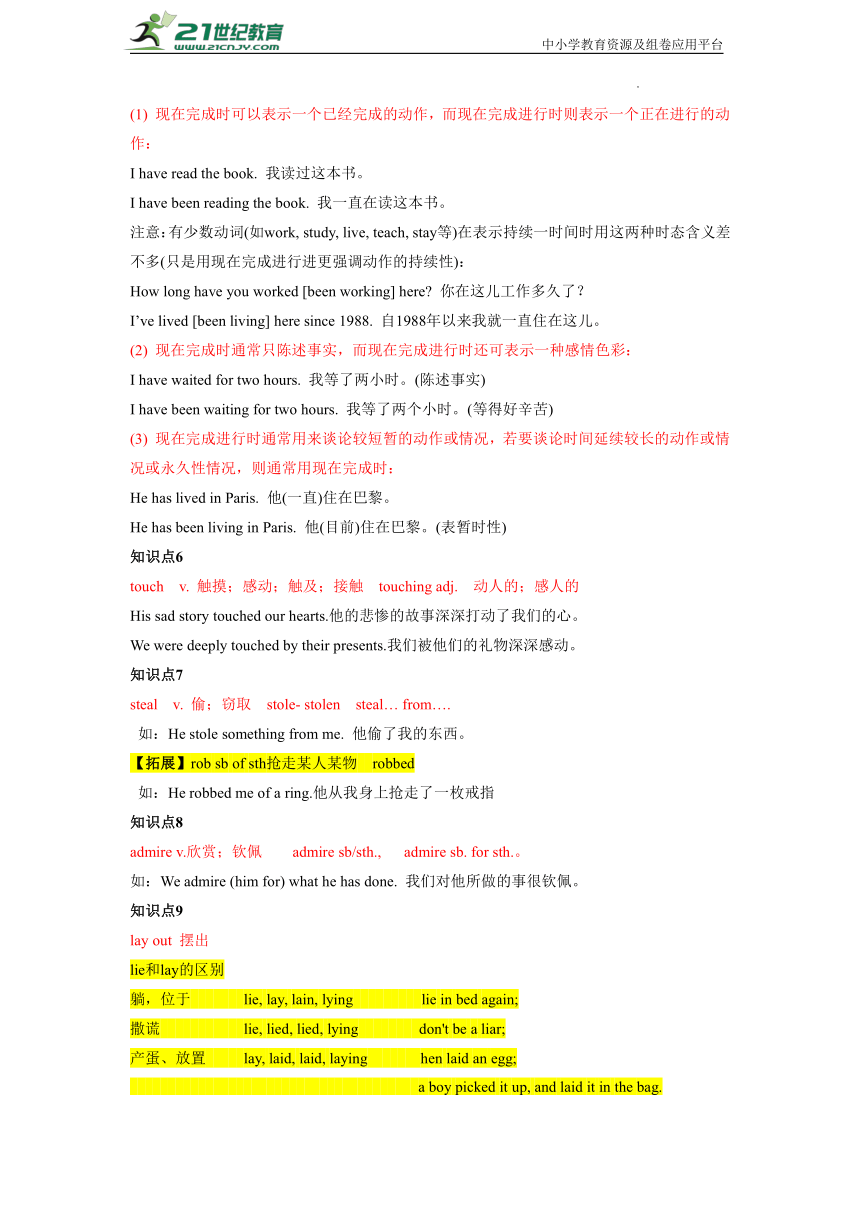
文档简介
中小学教育资源及组卷应用平台
Unit 2 I think that mooncakes are delicious.
九年级英语上册必备知识清单
一、词汇知识清单
I、课标词汇[注意英译汉]
mooncake n. 月饼 lantern n.灯笼 stranger n.陌生人 relative n.亲戚;亲属
pound n.磅 folk adj. 民间的 goddess n.女神 whoever pron.无论谁
steal v.偷;窃取 lay v.放置;安置 dessert n.甜点 garden n.花园
tradition n.传统 admire v.欣赏 tie n.领带 ghost n.鬼魂
trick n.花招;把戏 treat n.&v.招待;款待 Christmas n.圣诞节 lie v.存在;平躺
novel n.小说 dead adj.死的 business n.商业;生意 punish v.惩罚
warn v.警告;警戒 present n.现在;礼物 adj. 现在的 warmth n.温暖 spread v.传播
II、语法词汇知其变[注意词性变化]
1. stranger n. 陌生人----strange adj. 陌生的----strangely adv. 异常地
2. relative n. 亲属;亲戚----relative adj. 相对的;有关系的----relatively adv. 相当地;相对地,比较地----relate v. 使…有联系----related adj. 有关系的,有关联的----relation n.关系;联系----relationship n. 关系;关联
3. steal v. 偷;窃取----stealer n.偷窃者
4. garden n. 花园;园子----gardener n. 园丁;花匠;园艺家----gardening n.园艺
5. tradition n.传统----traditional adj. 传统的----traditionally adv. 传统上;习惯上;传说上
6. admire v. 欣赏;仰慕 ---- admiration n. 欣赏;仰慕----admirable adj. 令人钦佩的;极好的;值得赞扬的----admirably adv. 美好地,极好地;令人钦佩地
7. tie n. 领带 v. 捆;束----untie v. 解开;解决;使自由
8. haunted adj. 有鬼魂出没的;闹鬼的----haunt v. 常出没于…;萦绕于…;经常去…
9. trick n. 花招;把戏----tricky adj. 狡猾的;机警的;棘手的----tricks n. 技巧,诀窍;骗局
10. treat n. 款待;招待v. 招待;请(客)----treatment n.治疗
11. fool n. 蠢人;傻瓜 v. 愚弄adj. 愚蠢的 ----foolish adj. 愚蠢的;傻的
12. novel n.(长篇)小说----novelist n.小说家----novel adj. 新颖的----novelty n. 新奇;新奇的事物
13. dead adj. 死的;失去生命的----die v.死----death n.死的----dying adj. 垂死的;临终时(发生)的;濒临消亡的----deadly adj. 致命的;非常的;死一般的
14. business n. 生意;商业----busy adj. 忙碌的----businessman n.商人
15. punish v. 处罚;惩罚----punishment n. 处罚;惩罚----punished adj. 被惩罚的
16. warn v. 警告;告诫----warning n. 警告;预兆;预告 adj.警告的;引以为戒的
17. present n. 现在;礼物adj. 现在的 ----presently adv. 目前,不久----presentation n.描述;陈述----presence n.存在;出席;参加
18. warmth n. 温暖;暖和---- warm adj. 温暖的----warmly adv. 热情地;温暖地
19. spread v. 传播;展开 n. 蔓延;传播 ---spread 过去式----spread 过去分词
III、重点短语知搭配[注意固定短语的英汉互译]
Section A
1. eat out 在外吃饭
2. put on five pounds 体重增加5磅
3. be similar to 与…相似
4. wash away 冲走;清洗
wash away bad things (bad luck) 洗去坏运气
5. a time for cleaning 清洁卫生的一段时间
6. in the shape of... 呈…的形状
7. a traditional folk story 传统的民间故事
8. the most touching 最感人的
9.call out one’s name to... 对着…喊出某人的名字
10. lay out 摆开;布置
11. share sth. with sb. 与某人分享某物
12 Mother’s Day/ Father’s Day 母亲节/父亲节
13.become more and more popular 变得越来越流行
14. show our love 表达我们的爱
15. sound like 听起来像
16. the hottest month of the year 一年中最热的月份
17. from…to… 从…到…
18. throw…at… 朝…扔…
19. carry wishes to sb. 把祝福带给某人
20. shoot down 射下;击落
21. plan to do sth.= make a plan to do sth. 计划做某事
22. refuse to do sth. 拒绝做某事
23. fly up to the moon/ the sky 飞上月亮/天空
24.one …the other … 一个…另一个…
25. the tradition of admiring the moon 赏月的传统
26. as a result 因此,结果
27. on the second Sunday of May 五月的第二个星期日
Section B
1. dress up as 乔装打扮成
2. play a trick on sb. 和某人开玩笑
4. the true meaning of. …的真正意义
5. the spirit of.… …的精神
6. care about = worry about 担心;在乎
7. make more money 挣更多的钱
8. give out = hand out 分发
9. used to do sth. 过去经常做某事
10. warn sb. (not) to do sth. 警告某人(不要)做某事
11. end up 最终成为;最后处于
12. remind sb. of sth. 提醒某人某事
13. wake up 唤醒;醒来
14. the next morning 第二天早上
15. promise to do sth. 许诺做某事
16. spread love and joy everywhere 到处传播爱和欢乐
17. the beginning of new life 新生命的开始
18. give birth to… 给..生命,生下…
19.not only... but also... 不但…而且…
20. a symbol of new life 新生命的象征
21.trick or treat 不招待就捣蛋
22. learn about 了解
23. the importance of … …的重要性
24. a novel written by... …写的一本小说
25. expect sb. to do sth. 期待某人做某事
26. decide (not) to do sth. 决定(不)做某事
27. change one’s life 改变某人的生活
28. treat everyone with kindness and warmth 用温暖和友善对待每一个人
IV、核心单词知用法[注意固定短语、句型和词块]
知识点1
wonder v. 想知道(=want to know);n. 惊奇,奇迹(可数) adj. wonderful
I wonder what you call this.不知道你们把这个叫做什么。
They were filled with wonder at the new waterfall.他们对新瀑布感到非常惊奇。
【拓展】no wonder 难怪,怪不得 the eight wonders of the world 世界八大奇迹
知识点2
put on穿上;上演;增加;
What dress shall I put on for the meeting 我穿什么衣服去开会
He didn't want to put on more weight.他不想增加体重。
词义辨析
put on / wear / dress的区别
put on 表动作,“穿上”
She puts on her coat and goes away.她穿上大衣离开了。
wear 表状态,“穿着”
She wears an expensive coat.她穿着一件昂贵的大衣。
dress 作名词,表示衣服
She wears a beautiful evening dress.她穿着一件漂亮的晚礼服。
Dress 做动词
1、表示打扮
Little girls dress up as angels for the party. 小女孩们在聚会里打扮成天使的样子。
2、给…穿衣服(给别人穿,dress sb. 给自己穿,dress oneself=get dressed)
Could you help me to dress the little boy 你能帮我给这个小男孩穿一下衣服吗?
He is so young that he can’t dress himself (get dressed).
他太小了,他还不能给自己穿衣服。
3、穿着(be dressed in)
The little boy is dressed in a small T-shirt这个小男孩穿着一件小T恤。
in + 颜色,表穿着
The little boy in white is my younger brother.这个穿白色衣服的小男孩是我弟娃。
【拓展】put off推迟 put down放下;写下 put out扑灭
put up with忍受 put away收拾整理
知识点3
I’m going to Chiang Mai in two weeks.两周后我要去清迈。
(1)go/come/leave/start/arrive等表示位置移动的动词,常用这些动词的现在进行时表示将要发生的动作。
Jim is going boating this afternoon. Are they all coming tomorrow
(2)in two weeks两周后,表示将来的时间,常用how soon来对其提问。
---How soon will the dinner be ready ---In ten minutes.
这艘船不久就要起航开往纽约了。
知识点4
similar adj. 相似的;类似的
My best friend and I have similar hobbies.我和我最好的朋友有相似的爱好。
be similar to 与……相像的;类似的
My new hairstyle is similar to yours.我的新发型和你的相似。
similar与in连用时,构成be similar in sth.意为“在某方面相似/相仿”。例如:
The two buildings are similar in style.这两座大楼在形式上相似。
similar和same,二者都可作形容词,但含义不同。similar大致相似的;类似的。例如:
The brothers look similar.他们兄弟俩看上去很像。
same相同的;同样的,前面要加定冠词the。
They have the same age.他们的年龄相同。
知识点5
Chinese people have been celebrating Mid-Autumn Festival and enjoying mooncakes for centuries.
数个世纪以来,中国人民一直在庆祝中秋,吃月饼。
【解析】现在完成进行时:(have / has) + been + doing (since + 时间点 , for + 时间段)
如:I have been living in Shanghai for ten years.我在上海已经生活了十年。
【拓展】 现在完成进行时与现在完成时的区别
(1) 现在完成时可以表示一个已经完成的动作,而现在完成进行时则表示一个正在进行的动作:
I have read the book. 我读过这本书。
I have been reading the book. 我一直在读这本书。
注意:有少数动词(如work, study, live, teach, stay等)在表示持续一时间时用这两种时态含义差不多(只是用现在完成进行进更强调动作的持续性):
How long have you worked [been working] here 你在这儿工作多久了?
I’ve lived [been living] here since 1988. 自1988年以来我就一直住在这儿。
(2) 现在完成时通常只陈述事实,而现在完成进行时还可表示一种感彩:
I have waited for two hours. 我等了两小时。(陈述事实)
I have been waiting for two hours. 我等了两个小时。(等得好辛苦)
(3) 现在完成进行时通常用来谈论较短暂的动作或情况,若要谈论时间延续较长的动作或情况或永久性情况,则通常用现在完成时:
He has lived in Paris. 他(一直)住在巴黎。
He has been living in Paris. 他(目前)住在巴黎。(表暂时性)
知识点6
touch v. 触摸;感动;触及;接触 touching adj. 动人的;感人的
His sad story touched our hearts.他的悲惨的故事深深打动了我们的心。
We were deeply touched by their presents.我们被他们的礼物深深感动。
知识点7
steal v. 偷;窃取 stole- stolen steal… from….
如:He stole something from me. 他偷了我的东西。
【拓展】rob sb of sth抢走某人某物 robbed
如:He robbed me of a ring.他从我身上抢走了一枚戒指
知识点8
admire v.欣赏;钦佩 admire sb/sth., admire sb. for sth.。
如:We admire (him for) what he has done. 我们对他所做的事很钦佩。
知识点9
lay out 摆出
lie和lay的区别
躺,位于 lie, lay, lain, lying lie in bed again;
撒谎 lie, lied, lied, lying don't be a liar;
产蛋、放置 lay, laid, laid, laying hen laid an egg;
a boy picked it up, and laid it in the bag.
知识点10
1、spend(spend – spent - spent)可以用来花钱,也可以用来花时间,
句型:sb. spend +时间/金钱 + on sth / (in) doing sth. ;
He spends 2 hours in reading very day. 他每天花两小时阅读。
She spends much on new clothes. 他花很多钱买新衣服。
2、take(take -- took -- taken)的主语通常是事情,如果是"做什么事情"花费了时间,则常用it作形式主语,
句型: It take sb. + 时间 + to do…;
到那里花了他们5个小时。
It took them 5 hours to arrive there.
3、cost(cost-cost-cost) 的主语是“商品、服务”,也就是东西花人钱,也可以是花时间和力气,
句型:sth. cost sb. + 时间 / 金钱 / 力气 ;
The new car costs me 90000 yuan. 这辆新车花了我90000 元。
Writing the novel costs him a lot of time. 写这部书,花了他很多时间。
4、pay(paid- paid - paid) 意为支付,就是付钱,宾语通常是钱,常用介词 for 表示“为”什么而支付,
句型:sb. pay 金钱 + for + 事物;
He payed 90 yuan for the new dress. 他为新裙子付了90元。
知识点11
What do you think of Halloween 你认为万圣节怎么样?
【解析】What do you think of/about … = How do you like …
你认为……怎么样?(用来询问对方对某人或某事的看法和观点)
知识点12
famous = well-known adj. 著名的, 有名的
(1) be famous for 因……而著名 (某人因某种知识、技能或特征而出名)
(2) be famous as 作为…….而出名 (某人以某种身份而出名)
(3) be famous to + sb 被人所敬仰
知识点13
care → careful adj.→carefully adv 小心
(1)be careful= watch out=look out 小心
(2)be careful of 注意…,担心…
【拓展】care about “在乎;在意” , 后接名词或代词
care for = take care of 照顾 take care 留神;小心
知识点14
dead /ded/ adj. 死的;失去生命的
【拓展】die v. →(延续性动词) be dead 死,死亡 →death n. 死,死亡→dead adj. 死的 → dying adj. 将死的
知识点15
(1) use v.使用→useful adj. 有用的 use up 用完
(2) use sth to do sth 用某物做某事
(3) sth be used to do sth 被用来做某事=sth be used for doing sth
(4) be /get used to doing sth 习惯于做某事
(5)used to do sth 过去常常做某事,表示过去做过的事现在已经不做,只用于过去时态。
He used to wear glasses . But now he is used to wearing contact lenses.
他以前常戴(框架)眼镜,但现在习惯戴隐形眼镜。
【拓展】◆变成否定句或疑问句时要借助助动词didn’t/did
(1) 肯定形式:主语+used to+do…
I used to get up at six.
(2) 否定形式:主语+ didn’t use +to do …
如: He didn’t use to study hard.
(3)疑问形式:
①Did + 主语+ use + to do ….
答语: Yes, 主语+ did./ No, 主语+ didn’t
-- Did he use to go to school on foot --Yes, he did./No, he didn’t.
(4) 反意疑问句:
肯定句+ didn’t+ 主语?
He used to be very rich, didn’t he
否定句+ did +主语?
He didn’t use to smoke, did /used he
知识点16
warns v. 警告;告诫
warn sb. (not) to do sth.警告某人(不要)干某事
warn sb. about sth.提醒、警告某人注意某事
warn sb. against (doing)sth.警告某人某事
知识点17
end n/v 结尾 → ending n 结尾
(1) in the end = at last = finally=as a result 最后
(2) at the end of… 在…… 尽头
(3) by the end of … 在……结束时
(4)end up doing sth 终止做某事
(5) end up with sth 以…而结束
知识点18
tell : 辨别tell A from B 说出区别tell the differences between A and B
tell the truth 说真话 tell a lie说谎
tell the time “报时” tell a story讲故事
知识点19
expect v预料
(1) expect to do sth 预计做某事
(2) expect sb. to do sth = look forward to doing sth 期待做某事
(3) I expect so/not
知识点20
remind =make sb. remember v 使记住
【记】re+ mind → remind
(1) remind of 提醒,使记起
(2) remind sb. of sth 使某人记起某事
(3) remind sb. to do sth提醒某人去做某事
(4) remind sb. + that从句
知识点21
introduce v 介绍--introduction n 介绍;说明
(1)introduce oneself to sb. 向某人作自我介绍 Let me introduce myself to you.
(2) introduce A to B.把A介绍给B May I introduce my friend Jim to you
(3) introduce into 引进
知识点22
make→made →made v 制作
(1) make sb./sth + adj. “使某人/物……” make you happy
(2) make sb./sth do sth “使某人/物做某事”make me laugh.
(3)be made to do sth “被让去做某事”
The boy was made to stand out of the classroom.
V、高级结构会变通[注意高级在写作中的仿写]
I think that mooncakes are delicious. 我觉得月饼很好吃
Bill wonders whether they will have zongzi again next year.
比尔不知道明年是否还会吃粽子。
I wonder if it is similar to the water festival of the Thai people in Yunnan province.
我不知道它是不是与云南省傣族人的泼水节相似。
What a great day!多么美好的一天啊!
How he wished that Chang look could come back!他多么希望嫦娥能够回来。
But behind all these things lies the true meaning of Christmas: the importance of sharing and giving love and joy to the people around us.
但是在这一切背后是圣诞节的真正意义:分享并给予我们周围的人爱和欢乐的重要性。
A Christmas Carol is a famous short novel written by Charles Dickens.
《圣诞颂歌》是由查尔斯狄更斯创作的著名短篇小说.
8.It is about an old man named scrooge who never laughs or smiles.
它是关于一个叫斯克鲁奇的老人的故事,这个人从来都不大笑或微笑。
二、语法知识清单
(一)宾语从句
定义:在句子中起宾语作用的从句叫做宾语从句。
宾语从句连接词(that; whether/if; wh-)
◆that引导的宾语从句,that 在句中无词汇意义,在从句中不充当成分,在口语当中往往省略。
注:若出现两个或两上以上的由that引导的宾语从句,且由并列连词连接时,只有第一个连词that可以省略。如:She said (that) she would come and that she would also bring her son.
◆if / whether引导的宾语从句
1) if和whether作“是否”讲,一般情况下,二者没有区别,可以换用。
2) if和whether的区别
①whether与or not直接连用,如:I don’t know whether or not he will come tomorrow.
②whether与动词不定式连用,如:She can’t decide whether to go to America.
③从句作介词宾语时,只能用whether。如:I worry about whether I hurt her feeling.
④宾语从句置于句首表示强调时,应用whether,不用if。如:Whether this is true, I can’t say.
⑤if引导条件状语从句,意为“假如,如果”,如:If Simon comes here tomorrow, I’ll call you.
宾语从句语序:陈述语序
宾语从句时态
1)若主句是一般现在时,从句用任何所需时态。
2)若主句是一般过去时,从句则用跟过去相关的时态。
3)当宾语从句是表达客观真理和规律的句子,其时态用一般现在时。
(二)感叹句
◆what 引导的感叹句
①What + a/an +形容词+可数名词单数+主语+谓语!
②What +形容词+可数名词复数/不可数名词+主语+谓语!
◆how 引导的感叹句
①How +形容词 / 副词+主语+谓语!
② How +形容词+ a/an +可数名词单数+主语+谓语!
③How +主语+谓语!
三、语篇知识清单
本单元的话题是“谈论节日”。节日(Festivals)是中考常考的话题之一,该话题在书面表达中常见的呈现形式是介绍某个节日的庆祝方式,此时属于文化习俗方面的说明文。如果要求写一封信来介绍某个节日,则属于应用文。
常用短语
1.端午节the Dragon Boat Festival
2.春节the Spring Festival
3.元宵节the Lantern Festival
4.好运good luck
5.……的象征a symbol of
6.give gifts 送礼物
7.celebrate the festival 庆祝节日
8.have fun 玩的开心
9.good/delicious food美食
10.have a long history历史悠久
常用句子
1.My favorite traditional Chinese festival is the Dragon Boat Festival.
我最喜欢的中国传统节日就是端午节。
2.The New Year is celebrated on January 1st.1月1日庆祝元旦。
3.A popular activity during the Spring Festival is setting off fireworks.
春节期间一个受欢迎的活动就是放烟花。
4.Not only Chinese people but also foreigners are interested in the celebrations.
不仅中国人,而且外国人也对这些庆祝活动感兴趣。
5.The new year is a time for cleaning and washing away bad things.
新年是清扫和洗去晦气的时候。
6.You'll have good luck in the new year.你在新的一年里会交好运。
7.Chinese people have been celebrating the Mid-Autumn Festival and enjoying mooncakes for centuries.几个世纪以来,中国人一直都庆祝中秋节、吃月饼。
8.Do you know that there are two special days for parents in America
你知道美国有两个为父母而设立的特别日子吗?
【写作任务】
假如你是王丽,你的英国笔友Eliza 发来电子邮件询问你最喜欢的中国传统节日。请你给她回复邮件介绍你最喜欢的中国传统节日——端午节的情况。
参考词汇:阴历的 lunar
【思路点拨】
定基调
体裁:应用文(电子邮件);电子邮件的主体部分为说明文时态:介绍节日用一般现在时
人称:第三人称2. 谋布局、写句子
3. 巧衔接在本文中,第一次提到“端午节”时用全称the Dragon Boat Festival,再次提到时可以用it 代替;再如第一次提到“人们”时用people,再次提到时可用they 来代替。这种用代词指称前面的人或事物的方法,也是使文章保持连贯的一种衔接手段。
4. 成篇章
Dear Eliza,
I was so glad to get your e-mail. My favorite traditional Chinese festival is the Dragon Boat Festival.
____________________________________________________________________________________________________________________________________________________________________________________________________________________________________________________________________________________________________________________________________________________________________________________________________________________________________________________________________________________________________________________________________________________________________________________________________________________________________________________________________
Yours truly, Wang Li
5. 化“平凡”为“非凡”Everybody tries their best to win the race. → All the teammates pull together to achieve success.
2. 谋布局、写句子
(1) It is / falls / is celebrated on the fifth day of the fifth lunar month every year
(2) On this day people usually eat zongzi and hold dragon boat races
(3) have such great team spirit
4. 成篇章
Dear Eliza,
I was so glad to get your e-mail. My favorite traditional Chinese festival is the Dragon Boat Festival. It is one of the most important traditional festivals in China. It falls on the fifth day of the fifth lunar month every year. It’s a day to remember Qu Yuan, a great poet.
On this day people usually eat zongzi and hold dragon boat races. They also drink realgar wine, hang Chinese mugwort around the doors and wear a spice bag with them.
What makes the festival special for me is the dragon boat race. The members of the dragon boat team have such great team spirit — everybody tries their best to win the race.
Yours truly,
Wang Li
(北京)股份有限公司
Unit 2 I think that mooncakes are delicious.
九年级英语上册必备知识清单
一、词汇知识清单
I、课标词汇[注意英译汉]
mooncake n. 月饼 lantern n.灯笼 stranger n.陌生人 relative n.亲戚;亲属
pound n.磅 folk adj. 民间的 goddess n.女神 whoever pron.无论谁
steal v.偷;窃取 lay v.放置;安置 dessert n.甜点 garden n.花园
tradition n.传统 admire v.欣赏 tie n.领带 ghost n.鬼魂
trick n.花招;把戏 treat n.&v.招待;款待 Christmas n.圣诞节 lie v.存在;平躺
novel n.小说 dead adj.死的 business n.商业;生意 punish v.惩罚
warn v.警告;警戒 present n.现在;礼物 adj. 现在的 warmth n.温暖 spread v.传播
II、语法词汇知其变[注意词性变化]
1. stranger n. 陌生人----strange adj. 陌生的----strangely adv. 异常地
2. relative n. 亲属;亲戚----relative adj. 相对的;有关系的----relatively adv. 相当地;相对地,比较地----relate v. 使…有联系----related adj. 有关系的,有关联的----relation n.关系;联系----relationship n. 关系;关联
3. steal v. 偷;窃取----stealer n.偷窃者
4. garden n. 花园;园子----gardener n. 园丁;花匠;园艺家----gardening n.园艺
5. tradition n.传统----traditional adj. 传统的----traditionally adv. 传统上;习惯上;传说上
6. admire v. 欣赏;仰慕 ---- admiration n. 欣赏;仰慕----admirable adj. 令人钦佩的;极好的;值得赞扬的----admirably adv. 美好地,极好地;令人钦佩地
7. tie n. 领带 v. 捆;束----untie v. 解开;解决;使自由
8. haunted adj. 有鬼魂出没的;闹鬼的----haunt v. 常出没于…;萦绕于…;经常去…
9. trick n. 花招;把戏----tricky adj. 狡猾的;机警的;棘手的----tricks n. 技巧,诀窍;骗局
10. treat n. 款待;招待v. 招待;请(客)----treatment n.治疗
11. fool n. 蠢人;傻瓜 v. 愚弄adj. 愚蠢的 ----foolish adj. 愚蠢的;傻的
12. novel n.(长篇)小说----novelist n.小说家----novel adj. 新颖的----novelty n. 新奇;新奇的事物
13. dead adj. 死的;失去生命的----die v.死----death n.死的----dying adj. 垂死的;临终时(发生)的;濒临消亡的----deadly adj. 致命的;非常的;死一般的
14. business n. 生意;商业----busy adj. 忙碌的----businessman n.商人
15. punish v. 处罚;惩罚----punishment n. 处罚;惩罚----punished adj. 被惩罚的
16. warn v. 警告;告诫----warning n. 警告;预兆;预告 adj.警告的;引以为戒的
17. present n. 现在;礼物adj. 现在的 ----presently adv. 目前,不久----presentation n.描述;陈述----presence n.存在;出席;参加
18. warmth n. 温暖;暖和---- warm adj. 温暖的----warmly adv. 热情地;温暖地
19. spread v. 传播;展开 n. 蔓延;传播 ---spread 过去式----spread 过去分词
III、重点短语知搭配[注意固定短语的英汉互译]
Section A
1. eat out 在外吃饭
2. put on five pounds 体重增加5磅
3. be similar to 与…相似
4. wash away 冲走;清洗
wash away bad things (bad luck) 洗去坏运气
5. a time for cleaning 清洁卫生的一段时间
6. in the shape of... 呈…的形状
7. a traditional folk story 传统的民间故事
8. the most touching 最感人的
9.call out one’s name to... 对着…喊出某人的名字
10. lay out 摆开;布置
11. share sth. with sb. 与某人分享某物
12 Mother’s Day/ Father’s Day 母亲节/父亲节
13.become more and more popular 变得越来越流行
14. show our love 表达我们的爱
15. sound like 听起来像
16. the hottest month of the year 一年中最热的月份
17. from…to… 从…到…
18. throw…at… 朝…扔…
19. carry wishes to sb. 把祝福带给某人
20. shoot down 射下;击落
21. plan to do sth.= make a plan to do sth. 计划做某事
22. refuse to do sth. 拒绝做某事
23. fly up to the moon/ the sky 飞上月亮/天空
24.one …the other … 一个…另一个…
25. the tradition of admiring the moon 赏月的传统
26. as a result 因此,结果
27. on the second Sunday of May 五月的第二个星期日
Section B
1. dress up as 乔装打扮成
2. play a trick on sb. 和某人开玩笑
4. the true meaning of. …的真正意义
5. the spirit of.… …的精神
6. care about = worry about 担心;在乎
7. make more money 挣更多的钱
8. give out = hand out 分发
9. used to do sth. 过去经常做某事
10. warn sb. (not) to do sth. 警告某人(不要)做某事
11. end up 最终成为;最后处于
12. remind sb. of sth. 提醒某人某事
13. wake up 唤醒;醒来
14. the next morning 第二天早上
15. promise to do sth. 许诺做某事
16. spread love and joy everywhere 到处传播爱和欢乐
17. the beginning of new life 新生命的开始
18. give birth to… 给..生命,生下…
19.not only... but also... 不但…而且…
20. a symbol of new life 新生命的象征
21.trick or treat 不招待就捣蛋
22. learn about 了解
23. the importance of … …的重要性
24. a novel written by... …写的一本小说
25. expect sb. to do sth. 期待某人做某事
26. decide (not) to do sth. 决定(不)做某事
27. change one’s life 改变某人的生活
28. treat everyone with kindness and warmth 用温暖和友善对待每一个人
IV、核心单词知用法[注意固定短语、句型和词块]
知识点1
wonder v. 想知道(=want to know);n. 惊奇,奇迹(可数) adj. wonderful
I wonder what you call this.不知道你们把这个叫做什么。
They were filled with wonder at the new waterfall.他们对新瀑布感到非常惊奇。
【拓展】no wonder 难怪,怪不得 the eight wonders of the world 世界八大奇迹
知识点2
put on穿上;上演;增加;
What dress shall I put on for the meeting 我穿什么衣服去开会
He didn't want to put on more weight.他不想增加体重。
词义辨析
put on / wear / dress的区别
put on 表动作,“穿上”
She puts on her coat and goes away.她穿上大衣离开了。
wear 表状态,“穿着”
She wears an expensive coat.她穿着一件昂贵的大衣。
dress 作名词,表示衣服
She wears a beautiful evening dress.她穿着一件漂亮的晚礼服。
Dress 做动词
1、表示打扮
Little girls dress up as angels for the party. 小女孩们在聚会里打扮成天使的样子。
2、给…穿衣服(给别人穿,dress sb. 给自己穿,dress oneself=get dressed)
Could you help me to dress the little boy 你能帮我给这个小男孩穿一下衣服吗?
He is so young that he can’t dress himself (get dressed).
他太小了,他还不能给自己穿衣服。
3、穿着(be dressed in)
The little boy is dressed in a small T-shirt这个小男孩穿着一件小T恤。
in + 颜色,表穿着
The little boy in white is my younger brother.这个穿白色衣服的小男孩是我弟娃。
【拓展】put off推迟 put down放下;写下 put out扑灭
put up with忍受 put away收拾整理
知识点3
I’m going to Chiang Mai in two weeks.两周后我要去清迈。
(1)go/come/leave/start/arrive等表示位置移动的动词,常用这些动词的现在进行时表示将要发生的动作。
Jim is going boating this afternoon. Are they all coming tomorrow
(2)in two weeks两周后,表示将来的时间,常用how soon来对其提问。
---How soon will the dinner be ready ---In ten minutes.
这艘船不久就要起航开往纽约了。
知识点4
similar adj. 相似的;类似的
My best friend and I have similar hobbies.我和我最好的朋友有相似的爱好。
be similar to 与……相像的;类似的
My new hairstyle is similar to yours.我的新发型和你的相似。
similar与in连用时,构成be similar in sth.意为“在某方面相似/相仿”。例如:
The two buildings are similar in style.这两座大楼在形式上相似。
similar和same,二者都可作形容词,但含义不同。similar大致相似的;类似的。例如:
The brothers look similar.他们兄弟俩看上去很像。
same相同的;同样的,前面要加定冠词the。
They have the same age.他们的年龄相同。
知识点5
Chinese people have been celebrating Mid-Autumn Festival and enjoying mooncakes for centuries.
数个世纪以来,中国人民一直在庆祝中秋,吃月饼。
【解析】现在完成进行时:(have / has) + been + doing (since + 时间点 , for + 时间段)
如:I have been living in Shanghai for ten years.我在上海已经生活了十年。
【拓展】 现在完成进行时与现在完成时的区别
(1) 现在完成时可以表示一个已经完成的动作,而现在完成进行时则表示一个正在进行的动作:
I have read the book. 我读过这本书。
I have been reading the book. 我一直在读这本书。
注意:有少数动词(如work, study, live, teach, stay等)在表示持续一时间时用这两种时态含义差不多(只是用现在完成进行进更强调动作的持续性):
How long have you worked [been working] here 你在这儿工作多久了?
I’ve lived [been living] here since 1988. 自1988年以来我就一直住在这儿。
(2) 现在完成时通常只陈述事实,而现在完成进行时还可表示一种感彩:
I have waited for two hours. 我等了两小时。(陈述事实)
I have been waiting for two hours. 我等了两个小时。(等得好辛苦)
(3) 现在完成进行时通常用来谈论较短暂的动作或情况,若要谈论时间延续较长的动作或情况或永久性情况,则通常用现在完成时:
He has lived in Paris. 他(一直)住在巴黎。
He has been living in Paris. 他(目前)住在巴黎。(表暂时性)
知识点6
touch v. 触摸;感动;触及;接触 touching adj. 动人的;感人的
His sad story touched our hearts.他的悲惨的故事深深打动了我们的心。
We were deeply touched by their presents.我们被他们的礼物深深感动。
知识点7
steal v. 偷;窃取 stole- stolen steal… from….
如:He stole something from me. 他偷了我的东西。
【拓展】rob sb of sth抢走某人某物 robbed
如:He robbed me of a ring.他从我身上抢走了一枚戒指
知识点8
admire v.欣赏;钦佩 admire sb/sth., admire sb. for sth.。
如:We admire (him for) what he has done. 我们对他所做的事很钦佩。
知识点9
lay out 摆出
lie和lay的区别
躺,位于 lie, lay, lain, lying lie in bed again;
撒谎 lie, lied, lied, lying don't be a liar;
产蛋、放置 lay, laid, laid, laying hen laid an egg;
a boy picked it up, and laid it in the bag.
知识点10
1、spend(spend – spent - spent)可以用来花钱,也可以用来花时间,
句型:sb. spend +时间/金钱 + on sth / (in) doing sth. ;
He spends 2 hours in reading very day. 他每天花两小时阅读。
She spends much on new clothes. 他花很多钱买新衣服。
2、take(take -- took -- taken)的主语通常是事情,如果是"做什么事情"花费了时间,则常用it作形式主语,
句型: It take sb. + 时间 + to do…;
到那里花了他们5个小时。
It took them 5 hours to arrive there.
3、cost(cost-cost-cost) 的主语是“商品、服务”,也就是东西花人钱,也可以是花时间和力气,
句型:sth. cost sb. + 时间 / 金钱 / 力气 ;
The new car costs me 90000 yuan. 这辆新车花了我90000 元。
Writing the novel costs him a lot of time. 写这部书,花了他很多时间。
4、pay(paid- paid - paid) 意为支付,就是付钱,宾语通常是钱,常用介词 for 表示“为”什么而支付,
句型:sb. pay 金钱 + for + 事物;
He payed 90 yuan for the new dress. 他为新裙子付了90元。
知识点11
What do you think of Halloween 你认为万圣节怎么样?
【解析】What do you think of/about … = How do you like …
你认为……怎么样?(用来询问对方对某人或某事的看法和观点)
知识点12
famous = well-known adj. 著名的, 有名的
(1) be famous for 因……而著名 (某人因某种知识、技能或特征而出名)
(2) be famous as 作为…….而出名 (某人以某种身份而出名)
(3) be famous to + sb 被人所敬仰
知识点13
care → careful adj.→carefully adv 小心
(1)be careful= watch out=look out 小心
(2)be careful of 注意…,担心…
【拓展】care about “在乎;在意” , 后接名词或代词
care for = take care of 照顾 take care 留神;小心
知识点14
dead /ded/ adj. 死的;失去生命的
【拓展】die v. →(延续性动词) be dead 死,死亡 →death n. 死,死亡→dead adj. 死的 → dying adj. 将死的
知识点15
(1) use v.使用→useful adj. 有用的 use up 用完
(2) use sth to do sth 用某物做某事
(3) sth be used to do sth 被用来做某事=sth be used for doing sth
(4) be /get used to doing sth 习惯于做某事
(5)used to do sth 过去常常做某事,表示过去做过的事现在已经不做,只用于过去时态。
He used to wear glasses . But now he is used to wearing contact lenses.
他以前常戴(框架)眼镜,但现在习惯戴隐形眼镜。
【拓展】◆变成否定句或疑问句时要借助助动词didn’t/did
(1) 肯定形式:主语+used to+do…
I used to get up at six.
(2) 否定形式:主语+ didn’t use +to do …
如: He didn’t use to study hard.
(3)疑问形式:
①Did + 主语+ use + to do ….
答语: Yes, 主语+ did./ No, 主语+ didn’t
-- Did he use to go to school on foot --Yes, he did./No, he didn’t.
(4) 反意疑问句:
肯定句+ didn’t+ 主语?
He used to be very rich, didn’t he
否定句+ did +主语?
He didn’t use to smoke, did /used he
知识点16
warns v. 警告;告诫
warn sb. (not) to do sth.警告某人(不要)干某事
warn sb. about sth.提醒、警告某人注意某事
warn sb. against (doing)sth.警告某人某事
知识点17
end n/v 结尾 → ending n 结尾
(1) in the end = at last = finally=as a result 最后
(2) at the end of… 在…… 尽头
(3) by the end of … 在……结束时
(4)end up doing sth 终止做某事
(5) end up with sth 以…而结束
知识点18
tell : 辨别tell A from B 说出区别tell the differences between A and B
tell the truth 说真话 tell a lie说谎
tell the time “报时” tell a story讲故事
知识点19
expect v预料
(1) expect to do sth 预计做某事
(2) expect sb. to do sth = look forward to doing sth 期待做某事
(3) I expect so/not
知识点20
remind =make sb. remember v 使记住
【记】re+ mind → remind
(1) remind of 提醒,使记起
(2) remind sb. of sth 使某人记起某事
(3) remind sb. to do sth提醒某人去做某事
(4) remind sb. + that从句
知识点21
introduce v 介绍--introduction n 介绍;说明
(1)introduce oneself to sb. 向某人作自我介绍 Let me introduce myself to you.
(2) introduce A to B.把A介绍给B May I introduce my friend Jim to you
(3) introduce into 引进
知识点22
make→made →made v 制作
(1) make sb./sth + adj. “使某人/物……” make you happy
(2) make sb./sth do sth “使某人/物做某事”make me laugh.
(3)be made to do sth “被让去做某事”
The boy was made to stand out of the classroom.
V、高级结构会变通[注意高级在写作中的仿写]
I think that mooncakes are delicious. 我觉得月饼很好吃
Bill wonders whether they will have zongzi again next year.
比尔不知道明年是否还会吃粽子。
I wonder if it is similar to the water festival of the Thai people in Yunnan province.
我不知道它是不是与云南省傣族人的泼水节相似。
What a great day!多么美好的一天啊!
How he wished that Chang look could come back!他多么希望嫦娥能够回来。
But behind all these things lies the true meaning of Christmas: the importance of sharing and giving love and joy to the people around us.
但是在这一切背后是圣诞节的真正意义:分享并给予我们周围的人爱和欢乐的重要性。
A Christmas Carol is a famous short novel written by Charles Dickens.
《圣诞颂歌》是由查尔斯狄更斯创作的著名短篇小说.
8.It is about an old man named scrooge who never laughs or smiles.
它是关于一个叫斯克鲁奇的老人的故事,这个人从来都不大笑或微笑。
二、语法知识清单
(一)宾语从句
定义:在句子中起宾语作用的从句叫做宾语从句。
宾语从句连接词(that; whether/if; wh-)
◆that引导的宾语从句,that 在句中无词汇意义,在从句中不充当成分,在口语当中往往省略。
注:若出现两个或两上以上的由that引导的宾语从句,且由并列连词连接时,只有第一个连词that可以省略。如:She said (that) she would come and that she would also bring her son.
◆if / whether引导的宾语从句
1) if和whether作“是否”讲,一般情况下,二者没有区别,可以换用。
2) if和whether的区别
①whether与or not直接连用,如:I don’t know whether or not he will come tomorrow.
②whether与动词不定式连用,如:She can’t decide whether to go to America.
③从句作介词宾语时,只能用whether。如:I worry about whether I hurt her feeling.
④宾语从句置于句首表示强调时,应用whether,不用if。如:Whether this is true, I can’t say.
⑤if引导条件状语从句,意为“假如,如果”,如:If Simon comes here tomorrow, I’ll call you.
宾语从句语序:陈述语序
宾语从句时态
1)若主句是一般现在时,从句用任何所需时态。
2)若主句是一般过去时,从句则用跟过去相关的时态。
3)当宾语从句是表达客观真理和规律的句子,其时态用一般现在时。
(二)感叹句
◆what 引导的感叹句
①What + a/an +形容词+可数名词单数+主语+谓语!
②What +形容词+可数名词复数/不可数名词+主语+谓语!
◆how 引导的感叹句
①How +形容词 / 副词+主语+谓语!
② How +形容词+ a/an +可数名词单数+主语+谓语!
③How +主语+谓语!
三、语篇知识清单
本单元的话题是“谈论节日”。节日(Festivals)是中考常考的话题之一,该话题在书面表达中常见的呈现形式是介绍某个节日的庆祝方式,此时属于文化习俗方面的说明文。如果要求写一封信来介绍某个节日,则属于应用文。
常用短语
1.端午节the Dragon Boat Festival
2.春节the Spring Festival
3.元宵节the Lantern Festival
4.好运good luck
5.……的象征a symbol of
6.give gifts 送礼物
7.celebrate the festival 庆祝节日
8.have fun 玩的开心
9.good/delicious food美食
10.have a long history历史悠久
常用句子
1.My favorite traditional Chinese festival is the Dragon Boat Festival.
我最喜欢的中国传统节日就是端午节。
2.The New Year is celebrated on January 1st.1月1日庆祝元旦。
3.A popular activity during the Spring Festival is setting off fireworks.
春节期间一个受欢迎的活动就是放烟花。
4.Not only Chinese people but also foreigners are interested in the celebrations.
不仅中国人,而且外国人也对这些庆祝活动感兴趣。
5.The new year is a time for cleaning and washing away bad things.
新年是清扫和洗去晦气的时候。
6.You'll have good luck in the new year.你在新的一年里会交好运。
7.Chinese people have been celebrating the Mid-Autumn Festival and enjoying mooncakes for centuries.几个世纪以来,中国人一直都庆祝中秋节、吃月饼。
8.Do you know that there are two special days for parents in America
你知道美国有两个为父母而设立的特别日子吗?
【写作任务】
假如你是王丽,你的英国笔友Eliza 发来电子邮件询问你最喜欢的中国传统节日。请你给她回复邮件介绍你最喜欢的中国传统节日——端午节的情况。
参考词汇:阴历的 lunar
【思路点拨】
定基调
体裁:应用文(电子邮件);电子邮件的主体部分为说明文时态:介绍节日用一般现在时
人称:第三人称2. 谋布局、写句子
3. 巧衔接在本文中,第一次提到“端午节”时用全称the Dragon Boat Festival,再次提到时可以用it 代替;再如第一次提到“人们”时用people,再次提到时可用they 来代替。这种用代词指称前面的人或事物的方法,也是使文章保持连贯的一种衔接手段。
4. 成篇章
Dear Eliza,
I was so glad to get your e-mail. My favorite traditional Chinese festival is the Dragon Boat Festival.
____________________________________________________________________________________________________________________________________________________________________________________________________________________________________________________________________________________________________________________________________________________________________________________________________________________________________________________________________________________________________________________________________________________________________________________________________________________________________________________________________
Yours truly, Wang Li
5. 化“平凡”为“非凡”Everybody tries their best to win the race. → All the teammates pull together to achieve success.
2. 谋布局、写句子
(1) It is / falls / is celebrated on the fifth day of the fifth lunar month every year
(2) On this day people usually eat zongzi and hold dragon boat races
(3) have such great team spirit
4. 成篇章
Dear Eliza,
I was so glad to get your e-mail. My favorite traditional Chinese festival is the Dragon Boat Festival. It is one of the most important traditional festivals in China. It falls on the fifth day of the fifth lunar month every year. It’s a day to remember Qu Yuan, a great poet.
On this day people usually eat zongzi and hold dragon boat races. They also drink realgar wine, hang Chinese mugwort around the doors and wear a spice bag with them.
What makes the festival special for me is the dragon boat race. The members of the dragon boat team have such great team spirit — everybody tries their best to win the race.
Yours truly,
Wang Li
(北京)股份有限公司
同课章节目录
- Unit 1 How can we become good learners.
- Section A
- Section B
- Unit 2 I think that mooncakes are delicious!
- Section A
- Section B
- Unit 3 Could you please tell me where the restroom
- Section A
- Section B
- Unit 4 I used to be afraid of the dark.
- Section A
- Section B
- Unit 5 What are the shirts made of?
- Section A
- Section B
- Review of Units 1-5
- Unit 6 When was it invented?
- Section A
- Section B
- Unit 7 Teenagers should be allowed to choose their
- Section A
- Section B
- Unit 8 It must belong to Carla.
- Section A
- Section B
- Unit 9 I like music that I can dance to.
- Section A
- Section B
- Unit 10 You're supposed to shake hands.
- Section A
- Section B
- Review of Units 6-10
- Unit 11 Sad movies make me cry.
- Section A
- Section B
- Unit 12 Life is full of the unexpected
- Section A
- Section B
- Unit 13 We're trying to save the earth!
- Section A
- Section B
- Unit 14 I remember meeting all of you in Grade 7.
- Section A
- Section B
- Review of Units 11-14
